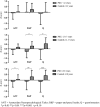Social-cognitive functioning and social skills in patients with early treated phenylketonuria: a PKU-COBESO study
- PMID: 26914933
- PMCID: PMC4851698
- DOI: 10.1007/s10545-016-9918-0
Social-cognitive functioning and social skills in patients with early treated phenylketonuria: a PKU-COBESO study
Abstract
Objective: Early treatment of phenylketonuria (ET-PKU) prevents mental retardation, but many patients still show cognitive and mood problems. In this study, it was investigated whether ET-PKU-patients have specific phenylalanine (Phe-)related problems with respect to social-cognitive functioning and social skills.
Methods: Ninety five PKU-patients (mean age 21.6 ± 10.2 years) and 95 healthy controls (mean age 19.6 ± 8.7 years) were compared on performance of computerized and paper-and-pencil tasks measuring social-cognitive abilities and on parent- and self-reported social skills, using multivariate analyses of variance, and controlling for general cognitive ability (IQ-estimate). Further comparisons were made between patients using tetrahydrobiopterin (BH4, N = 30) and patients not using BH4. Associations with Phe-levels on the day of testing, during childhood, during adolescence and throughout life were examined.
Results: PKU-patients showed poorer social-cognitive functioning and reportedly had poorer social skills than controls (regardless of general cognitive abilities). Quality of social-cognitive functioning was negatively related to recent Phe-levels and Phe-levels between 8 and 12 years for adolescents with PKU. Quality of social skills was negatively related to lifetime phenylalanine levels in adult patients, and specifically to Phe-levels between 0 and 7, and between 8 and 12 years. There were no differences with respect to social outcome measures between the BH4 and non-BH4 groups.
Conclusion: PKU-patients have Phe-related difficulties with social-cognitive functioning and social skills. Problems seem to be more evident among adolescents and adults with PKU. High Phe-levels during childhood and early adolescence seem to be of greater influence than current and recent Phe-levels for these patients.
Conflict of interest statement
Conflict of interest
R. Jahja has received honoraria as a speaker and consultant for Merck Serono.
F. J. van Spronsen is a member of various Scientific Advisory Boards of Merck Serono and Danone and has received grants for research purpose of both Merck Serono and Nutricia. Further he has received consultation fees and speaker relation fees from Merck Serono, Nutricia, and Swedish Orphan. He has assisted in the design of clinical studies using products manufactured by Merck Serono SA. He chairs the Scientific Advisory Board of the ESPKU and is the chairman of the group developing guidelines on PKU in Europe.
L. M. J. de Sonneville declares receipt of consultation fees as consultant of Danone, FrieslandCampina, and Global Pharma Consultancy.
A. M. Bosch is a member of Scientific Advisory Boards of Merck Serono and Danone.
S. C. J. Huijbregts has participated in strategic advisory boards and received honoraria as a consultant and/or speaker for Merck Serono SA, Biomarin and Nutricia. He is also a member of the group developing guidelines on PKU in Europe.
J. J. van der Meere, C. E. M. Hollak, M. E. Rubio-Gozalbo, M. C. G. J. Brouwers, F. C. Hofstede, M. C. de Vries, M. C. H. Janssen, A. T. van der Ploeg, and J. G. Langendonk declare that they have no conflict of interest.
Informed consent
All procedures followed were in accordance with the ethical standards of the responsible committee on human experimentation (institutional and national) and with the Helsinki Declaration of 1975, as revised in 2000. Informed consent was obtained from all participants for being included in the study.
Figures
References
-
- Baron-Cohen S, Wheelwright S, Hill J, Raste Y, Plumb I (2001) The “reading the mind in the eyes” test revised version: a study with normal adults, and adults with Asperger syndrome or high-functioning autism. J Child Psychol Psychiatry 42:241–251 - PubMed
Publication types
MeSH terms
Substances
LinkOut - more resources
Full Text Sources
Other Literature Sources
Medical


